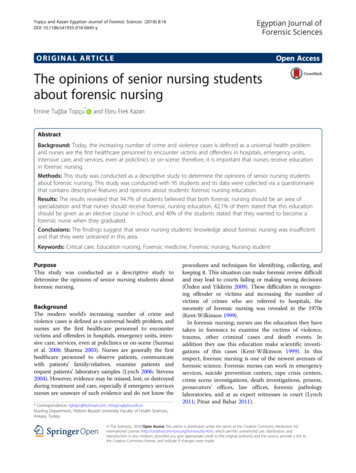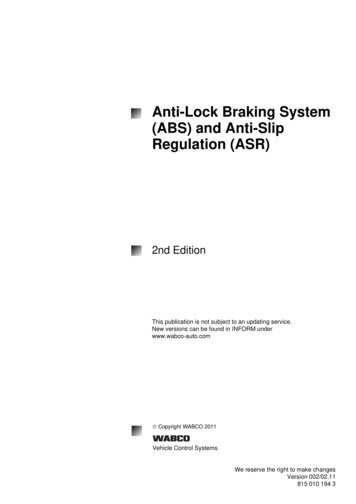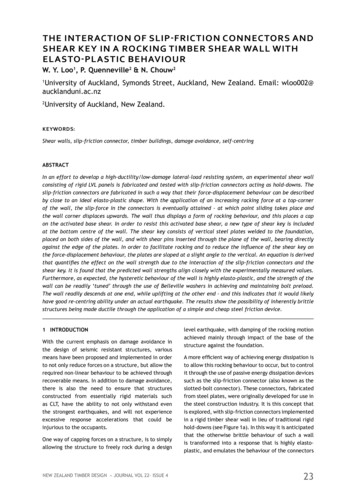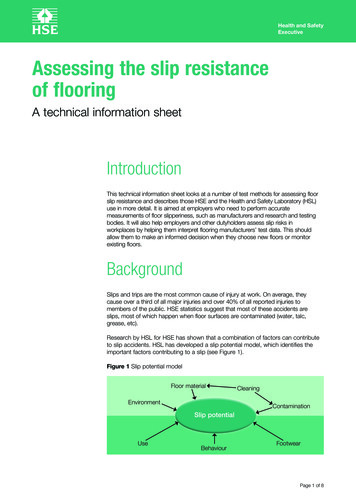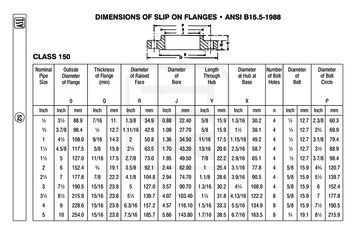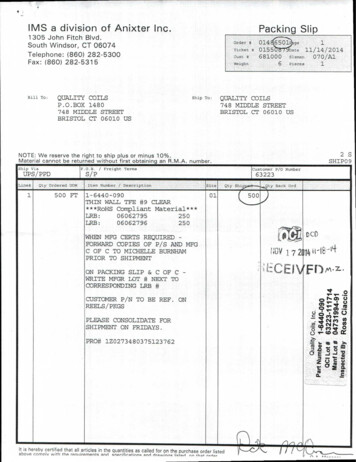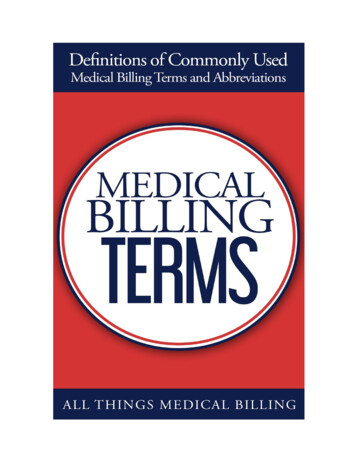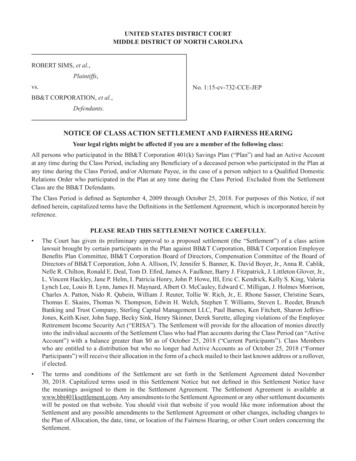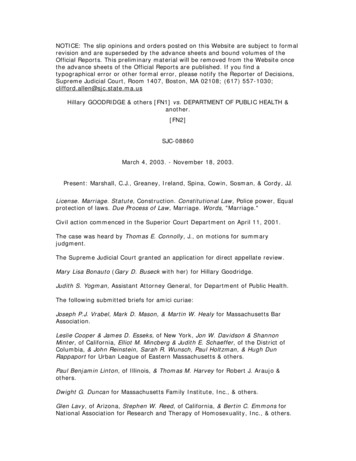
Transcription
NOTICE: The slip opinions and orders posted on this Website are subject to formalrevision and are superseded by the advance sheets and bound volumes of theOfficial Reports. This preliminary material will be removed from the Website oncethe advance sheets of the Official Reports are published. If you find atypographical error or other formal error, please notify the Reporter of Decisions,Supreme Judicial Court, Room 1407, Boston, MA 02108; (617) 557-1030;clifford.allen@sjc.state.ma.usHillary GOODRIDGE & others [FN1] vs. DEPARTMENT OF PUBLIC HEALTH &another.[FN2]SJC-08860March 4, 2003. - November 18, 2003.Present: Marshall, C.J., Greaney, Ireland, Spina, Cowin, Sosman, & Cordy, JJ.License. Marriage. Statute, Construction. Constitutional Law, Police power, Equalprotection of laws. Due Process of Law, Marriage. Words, "Marriage."Civil action commenced in the Superior Court Department on April 11, 2001.The case was heard by Thomas E. Connolly, J., on motions for summaryjudgment.The Supreme Judicial Court granted an application for direct appellate review.Mary Lisa Bonauto (Gary D. Buseck with her) for Hillary Goodridge.Judith S. Yogman, Assistant Attorney General, for Department of Public Health.The following submitted briefs for amici curiae:Joseph P.J. Vrabel, Mark D. Mason, & Martin W. Healy for Massachusetts BarAssociation.Leslie Cooper & James D. Esseks, of New York, Jon W. Davidson & ShannonMinter, of California, Elliot M. Mincberg & Judith E. Schaeffer, of the District ofColumbia, & John Reinstein, Sarah R. Wunsch, Paul Holtzman, & Hugh DunRappaport for Urban League of Eastern Massachusetts & others.Paul Benjamin Linton, of Illinois, & Thomas M. Harvey for Robert J. Araujo &others.Dwight G. Duncan for Massachusetts Family Institute, Inc., & others.Glen Lavy, of Arizona, Stephen W. Reed, of California, & Bertin C. Emmons forNational Association for Research and Therapy of Homosexuality, Inc., & others.
Robert W. Ash & Vincent P. McCarthy, of Connecticut, & Philip E. Cleary for TheCommon Good Foundation & others.Don Stenberg, Attorney General of Nebraska, Mark L. Shurtleff, Attorney Generalof Utah, Brent A. Burnett, Assistant Attorney General of Utah, & Mark Barnett,Attorney General of South Dakota, for the State of Utah & others.Chester Darling & Michael Williams for Massachusetts Citizens Alliance & another.Daniel Avila for The Catholic Action League of Massachusetts.Joshua K. Baker, of California, & Robert G. Caprera for José Martín de Agar &others.Wendy J. Herdlein, of California, & James R. Knudsen for the Honorable PhilipTravis & others.Steven W. Fitschen, of Virginia, for The National Legal Foundation.Jeffrey A. Shafer & David R. Langdon, of Ohio, William C. Duncan, of Utah, &Wendy J. Herdlein, of California, for Marriage Law Project.Lisa Rae, Kenneth Elmore, Arthur Berney, & Josephine Ross for The ReligiousCoalition for the Freedom to Marry & others.Ann DiMaria for The Ethics & Religious Liberty Commission & others.Anthony Mirenda, Vickie L. Henry, Lucy Fowler, John M. Granberry, Rachel N.Lessem, & Gabriel M. Helmer for Robert F. Williams & others.Kenneth J. Parsigian for Peter W. Bardaglio & others. David Cruz, of New York,John Taylor Williams, Carol V. Rose, Debra Squires-Lee, Christopher Morrison, &Marni Goldstein Caputo for William E. Adams & others.Martin J. Newhouse & Katharine Bolland for Coalition gaie et lesbienne du Québec& others.Joseph Ureneck, pro se.Teresa S. Collett, of Texas, & Luke Stanton for Free Market Foundation.Peter F. Zupcofska, L. Tracee Whitley, Heidi A. Nadel, & Corin R. Swift for BostonBar Association & another.Mary Jo Johnson, Jonathan A. Shapiro, & Amy L. Nash for The MassachusettsPsychiatric Society & others.Tony R. Maida, Nina Joan Kimball, & Justine H. Brousseau for Libby Adler & others.Daryl J. Lapp, Kevin D. Batt, & Katharine Silbaugh for Monroe Inker & another.David Zwiebel, Mordechai Biser, & Nathan J. Diament, of New York, & Abba Cohen,
of the District of Columbia, for Agudath Israel of America & others.MARSHALL, C.J.Marriage is a vital social institution. The exclusive commitment of two individualsto each other nurtures love and mutual support; it brings stability to our society.For those who choose to marry, and for their children, marriage provides anabundance of legal, financial, and social benefits. In return it imposes weightylegal, financial, and social obligations. The question before us is whether,consistent with the Massachusetts Constitution, the Commonwealth may deny theprotections, benefits, and obligations conferred by civil marriage to two individualsof the same sex who wish to marry. We conclude that it may not. TheMassachusetts Constitution affirms the dignity and equality of all individuals. Itforbids the creation of second-class citizens. In reaching our conclusion we havegiven full deference to the arguments made by the Commonwealth. But it hasfailed to identify any constitutionally adequate reason for denying civil marriage tosame-sex couples.We are mindful that our decision marks a change in the history of our marriagelaw. Many people hold deep-seated religious, moral, and ethical convictions thatmarriage should be limited to the union of one man and one woman, and thathomosexual conduct is immoral. Many hold equally strong religious, moral, andethical convictions that same-sex couples are entitled to be married, and thathomosexual persons should be treated no differently than their heterosexualneighbors. Neither view answers the question before us. Our concern is with theMassachusetts Constitution as a charter of governance for every person properlywithin its reach. "Our obligation is to define the liberty of all, not to mandate ourown moral code." Lawrence v. Texas, 123 S.Ct. 2472, 2480 (2003) (Lawrence ),quoting Planned Parenthood of Southeastern Pa. v. Casey, 505 U.S. 833, 850(1992).Whether the Commonwealth may use its formidable regulatory authority to barsame-sex couples from civil marriage is a question not previously addressed by aMassachusetts appellate court. [FN3] It is a question the United States SupremeCourt left open as a matter of Federal law in Lawrence, supra at 2484, where itwas not an issue. There, the Court affirmed that the core concept of commonhuman dignity protected by the Fourteenth Amendment to the United StatesConstitution precludes government intrusion into the deeply personal realms ofconsensual adult expressions of intimacy and one's choice of an intimate partner.The Court also reaffirmed the central role that decisions whether to marry or havechildren bear in shaping one's identity. Id. at 2481. The MassachusettsConstitution is, if anything, more protective of individual liberty and equality thanthe Federal Constitution; it may demand broader protection for fundamentalrights; and it is less tolerant of government intrusion into the protected spheres ofprivate life.Barred access to the protections, benefits, and obligations of civil marriage, aperson who enters into an intimate, exclusive union with another of the same sexis arbitrarily deprived of membership in one of our community's most rewardingand cherished institutions. That exclusion is incompatible with the constitutionalprinciples of respect for individual autonomy and equality under law.I
The plaintiffs are fourteen individuals from five Massachusetts counties. As of April11, 2001, the date they filed their complaint, the plaintiffs Gloria Bailey, sixtyyears old, and Linda Davies, fifty-five years old, had been in a committedrelationship for thirty years; the plaintiffs Maureen Brodoff, forty-nine years old,and Ellen Wade, fifty-two years old, had been in a committed relationship fortwenty years and lived with their twelve year old daughter; the plaintiffs HillaryGoodridge, forty-four years old, and Julie Goodridge, forty-three years old, hadbeen in a committed relationship for thirteen years and lived with their five yearold daughter; the plaintiffs Gary Chalmers, thirty-five years old, and RichardLinnell, thirty-seven years old, had been in a committed relationship for thirteenyears and lived with their eight year old daughter and Richard's mother; theplaintiffs Heidi Norton, thirty-six years old, and Gina Smith, thirty-six years old,had been in a committed relationship for eleven years and lived with their twosons, ages five years and one year; the plaintiffs Michael Horgan, forty-one yearsold, and David Balmelli, forty-one years old, had been in a committed relationshipfor seven years; and the plaintiffs David Wilson, fifty-seven years old, and RobertCompton, fifty-one years old, had been in a committed relationship for four yearsand had cared for David's mother in their home after a serious illness until shedied.The plaintiffs include business executives, lawyers, an investment banker,educators, therapists, and a computer engineer. Many are active in church,community, and school groups. They have employed such legal means as areavailable to them--for example, joint adoption, powers of attorney, and jointownership of real property--to secure aspects of their relationships. Each plaintiffattests a desire to marry his or her partner in order to affirm publicly theircommitment to each other and to secure the legal protections and benefitsafforded to married couples and their children.The Department of Public Health (department) is charged by statute withsafeguarding public health. See G.L. c. 17. Among its responsibilities, thedepartment oversees the registry of vital records and statistics (registry), which"enforce[s] all laws" relative to the issuance of marriage licenses and the keepingof marriage records, see G.L. c. 17, § 4, and which promulgates policies andprocedures for the issuance of marriage licenses by city and town clerks andregisters. See, e.g., G.L. c. 207, §§ 20, 28A, and 37. The registry is headed by aregistrar of vital records and statistics (registrar), appointed by the Commissionerof Public Health (commissioner) with the approval of the public health council andsupervised by the commissioner. See G.L. c. 17, § 4.In March and April, 2001, each of the plaintiff couples attempted to obtain amarriage license from a city or town clerk's office. As required under G.L. c. 207,they completed notices of intention to marry on forms provided by the registry,see G.L. c. 207, § 20, and presented these forms to a Massachusetts town or cityclerk, together with the required health forms and marriage license fees. See G.L.c. 207, § 19. In each case, the clerk either refused to accept the notice ofintention to marry or denied a marriage license to the couple on the ground thatMassachusetts does not recognize same- sex marriage. [FN4], [FN5] Becauseobtaining a marriage license is a necessary prerequisite to civil marriage inMassachusetts, denying marriage licenses to the plaintiffs was tantamount todenying them access to civil marriage itself, with its appurtenant social and legalprotections, benefits, and obligations. [FN6]
On April 11, 2001, the plaintiffs filed suit in the Superior Court against thedepartment and the commissioner seeking a judgment that "the exclusion of the[p]laintiff couples and other qualified same-sex couples from access to marriagelicenses, and the legal and social status of civil marriage, as well as theprotections, benefits and obligations of marriage, violates Massachusetts law." SeeG.L. c. 231A. The plaintiffs alleged violation of the laws of the Commonwealth,including but not limited to their rights under arts. 1, 6, 7, 10, 12, and 16, andPart II, c. 1, § 1, art. 4, of the Massachusetts Constitution. [FN7], [FN8]The department, represented by the Attorney General, admitted to a policy andpractice of denying marriage licenses to same-sex couples. It denied that itsactions violated any law or that the plaintiffs were entitled to relief. The partiesfiled cross motions for summary judgment.A Superior Court judge ruled for the department. In a memorandum of decisionand order dated May 7, 2002, he dismissed the plaintiffs' claim that the marriagestatutes should be construed to permit marriage between persons of the samesex, holding that the plain wording of G.L. c. 207, as well as the wording of othermarriage statutes, precluded that interpretation. Turning to the constitutionalclaims, he held that the marriage exclusion does not offend the liberty, freedom,equality, or due process provisions of the Massachusetts Constitution, and that theMassachusetts Declaration of Rights does not guarantee "the fundamental right tomarry a person of the same sex." He concluded that prohibiting same-sexmarriage rationally furthers the Legislature's legitimate interest in safeguardingthe "primary purpose" of marriage, "procreation." The Legislature may rationallylimit marriage to opposite-sex couples, he concluded, because those couples are"theoretically . capable of procreation," they do not rely on "inherently morecumbersome" noncoital means of reproduction, and they are more likely thansame-sex couples to have children, or more children.After the complaint was dismissed and summary judgment entered for thedefendants, the plaintiffs appealed. Both parties requested direct appellate review,which we granted.IIAlthough the plaintiffs refer in passing to "the marriage statutes," they focus, quiteproperly, on G.L. c. 207, the marriage licensing statute, which controls entry intocivil marriage. As a preliminary matter, we summarize the provisions of that law.General Laws c. 207 is both a gatekeeping and a public records statute. It setsminimum qualifications for obtaining a marriage license and directs city and townclerks, the registrar, and the department to keep and maintain certain "vitalrecords" of civil marriages. The gatekeeping provisions of G.L. c. 207 are minimal.They forbid marriage of individuals within certain degrees of consanguinity, §§ 1and 2, and polygamous marriages. See G.L. c. 207, § 4. See also G.L. c. 207, § 8(marriages solemn
Don Stenberg, Attorney General of Nebraska, Mark L. Shurtleff, Attorney General of Utah, Brent A. Burnett, Assistant Attorney General of Utah, & Mark Barnett, Attorney General of South Dakota, for the State of Utah & others. Chester Darling & Michael Williams for Massachusetts Citizens Alliance & another. Daniel Avila for The Catholic Action League of Massachusetts. Joshua K. Baker, of .
